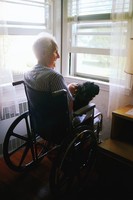Study: State not reviewing 'natural' deaths in waiver program for disabled
September 14, 2008
"There have been cases around the country of people in this population dying prematurely because of abuse and neglect," said Walter Ochinko, assistant director of health care for the GAO, which is the investigative arm for Congress. "There need to be systems in place to ensure that when a person dies, it really is of natural causes. Of all the states we looked at, it's clear Texas was the outlier."
Written by Emily Ramshaw, The Dallas Morning News

AUSTIN – Linda Rava learned her profoundly disabled son was dying in an early-morning phone call from his Houston care facility. He had pneumonia, doctors told her. His lungs had filled with fluid. Within hours of her arrival at the hospital, he was dead.
Ms. Rava was grief-stricken, and the facts didn't line up. Just a week earlier, she had returned with her healthy 29-year-old from a family beach vacation. And she'd heard from her son and his care providers two days before his death, with no indication that Carlos was sick or suffering.
But doctors never performed an autopsy. And when an in-house review determined there was no wrongdoing in Carlos' death, Ms. Rava said, that's as far as it went.
"I was shocked, brokenhearted," Ms. Rava said. "I kept saying, 'Is there something else I should've done? Or something they should've done? I don't understand how this could've happened so fast.' "
Ms. Rava's experience wasn't unusual. This summer, a 14-state report released by the U.S. Government Accountability Office found Texas was the only state that didn't review the deaths of people who succumb to "natural causes" in home or community-based care.
"There have been cases around the country of people in this population dying prematurely because of abuse and neglect," said Walter Ochinko, assistant director of health care for the GAO, which is the investigative arm for Congress. "There need to be systems in place to ensure that when a person dies, it really is of natural causes. Of all the states we looked at, it's clear Texas was the outlier."
Texas officials say that at the time the report was issued, they were already exploring ways to improve their death data in home and community-based care settings.
"Since that time, we have developed and implemented a death review process," said Department of Aging and Disability Services spokeswoman Laura Albrecht. She said the agency is working to compile the data to determine quality of care, and to identify areas for possible policy changes.
Texas' Medicaid waiver programs give people with disabilities the option to receive care in group homes, with parents or in foster care – all alternatives to living in one of Texas' 13 state schools. These schools are currently under investigation by the U.S. Department of Justice for allegations of civil rights violations.
But the waiver slots are in high demand; tens of thousands of people are on state waiting lists for them. While opponents of institutionalized care champion these home-living scenarios as the best and safest solution for people with disabilities, state school supporters say community-based living isn't for everyone – and they point to shortfalls such as the absence of death investigations.
"The concept is beautiful, but the reality is that right now, these services are no better or no worse than the state schools," said Ms. Rava, whose son waited 10 years for a Home and Community-based Services waiver slot and died a week after moving into the program. "It's all the same direct-care staff. There are just as many chances for things to go wrong."
Since 2002, 447 people have died in Texas' Home and Community-based Services program, one of several state waiver programs. There's no way to know whether they died of natural causes, abuse or neglect; as recently as last week, the state still didn't separate those numbers.
While all deaths in waiver programs must be reported to the state, this summer's federal report found that Texas did the bare minimum. At the time, the state didn't review "unexpected deaths" – only deaths where there was obvious abuse and neglect. It didn't use medical professionals to conduct death reviews, the report found. It didn't use death statistics to address quality-of-care issues, or to identify dangerous trends.
Of the 14 states that make up two-thirds of all Medicaid waiver patients, Texas is the only one that simply reported deaths and did nothing more.
"One of the reasons we picked Texas is because it serves a large proportion of these people," Mr. Ochinko said. "Of all the states we looked at, it stands out as the one that is doing the least in this area."
Ms. Albrecht said that since the report was released, the agency has started reviewing unexpected deaths and using medical professionals in death reviews, and has other procedures in place to get Texas up to speed.
![]()
![]()
Related Stories
![]()
Fair Use Notice
This site contains copyrighted material the use of which has not always been specifically authorized by the copyright owner. We are making such material available in our efforts to advance understanding of environmental, political, human rights, economic, democracy, scientific, and social justice issues, etc. We believe this constitutes a "fair use" of any such copyrighted material as provided for in section 107 of the US Copyright Law. In accordance with Title 17 U.S.C. Section 107, the material on this site is distributed without profit to those who have expressed a prior interest in receiving the included information for research and educational purposes. For more information go to: http://www.law.cornell.edu/uscode/17/107.shtml. If you wish to use copyrighted material from this site for purposes of your own that go beyond "fair use", you must obtain permission from the copyright owner.